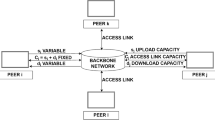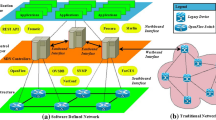Abstract
We consider bandwidth-sharing networks, and show how the SRPT (Shortest Remaining Processing Time) discipline can be used in order to improve the delay performance of the system. Our main idea is not to use SRPT globally between the traffic classes, which has been shown to induce instability, but rather deploy SRPT only locally within each traffic class. We show that with this approach, the performance of any stable bandwidth allocation policy can be improved. Importantly, our result is valid for any network topology and any flow size distribution. A numerical study is included to illustrate the results.
Similar content being viewed by others
References
Avrahami, N., & Azar, Y. (2007). Minimizing total flow time and total completion time with immediate dispatching. Algorithmica, 47, 253–268.
Bertsekas, D., & Gallager, R. (1992). Data networks (2nd edn.). New York: Prentice-Hall.
Bonald, T., & Massoulié, L. (2001). Impact of fairness on Internet performance. In ACM sigmetrics 2001 (pp. 82–91). Cambridge, MA.
Bonald, T., & Proutière, A. (2003). Insensitive bandwidth sharing in data networks. Queueing Systems, 44, 69–100.
Bramson, M. (2005). Stability of networks for max-min fair routing. In 13th INFORMS applied probability conference, Ottawa, Canada.
Chang, C. S., & Yao, D. D. (1993). Rearrangement, majorization, and stochastic scheduling. Mathematics of Operations Research, 18, 658–684.
Crovella, M., & Bestavros, A. (1996). Self-similarity in world wide web traffic: evidence and possible causes. In ACM SIGMETRICS 1996 (pp. 160–169), Philadelphia, PA.
de Veciana, G., Lee, T.-J., & Konstantopoulos, T. (2001). Stability and performance analysis of networks supporting elastic services. IEEE Transactions on Networking, 8, 556–567.
Feldmann, A., & Whitt, W. (1997). Fitting mixtures of exponentials to long-tail distributions to analyze network performance models. In IEEE infocom 1997 (pp. 1096–1104), Kobe, Japan.
Gromoll, H. C., & Williams, R. J. (2006). Fluid limit of a network with fair bandwidth sharing and general document size distribution. Preprint.
Hirayama, T., & Kijima, M. (1992). Single machine scheduling problem when the machine capacity varies stochastically. Operations Research, 40, 376–383.
Kelly, F. P. (1997). Charging and rate control for elastic traffic. European Transactions on Telecommunications, 8, 33–37.
Kelly, F. P., Maulloo, A. K., & Tan, D. K. H. (1998). Rate control in communication networks: shadow prices, proportional fairness and stability. Journal of the Operational Research Society, 49, 237–252.
Massoulié, L., & Roberts, J. (1999). Bandwidth sharing: objectives and algorithms. In IEEE infocom 1999 (pp. 1395–1403), New York, NY.
Massoulié, L., & Roberts, J. (2000). Bandwidth sharing and admission control for elastic traffic. Telecommunication Systems, 15, 185–201.
Massoulié, L. (2005). Structural properties of proportional fairness: stability and insensitivity. Preprint.
Mo, J., & Walrand, J. (2000). Fair end-to-end window-based congestion control. IEEE Transactions on Networking, 8, 556–567.
Schrage, L. E. (1968). A proof of the optimality of the shortest remaining processing time discipline. Operations Research, 16, 687–690.
Smith, D. R. (1978). A new proof of the optimality of the shortest remaining processing time discipline. Operations Research, 26, 197–199.
Verloop, I. M., Borst, S. C., & Núñez-Queija, R. (2005). Stability of size-based scheduling disciplines in resource-sharing networks. Performance Evaluation, 62, 247–262.
Verloop, I. M., Borst, S. C., & Núñez-Queija, R. (2006). Delay optimization in bandwidth-sharing networks. In CISS 2006, Princeton, NJ.
Yashkov, S. F. (1987). Processor-sharing queues: some progress in analysis. Queueing Systems, 2, 1–17.
Ye, H.-Q. (2003). Stability of data networks under an optimization-based bandwidth allocation. IEEE Transactions on Automatic Control, 48, 1238–1242.
Ye, H.-Q., Ou, J., & Yuan, X.-M. (2005). Stability of data networks: stationary and bursty models. Operations Research, 53, 107–125.
Author information
Authors and Affiliations
Corresponding author
Rights and permissions
About this article
Cite this article
Aalto, S., Ayesta, U. SRPT applied to bandwidth-sharing networks. Ann Oper Res 170, 3–19 (2009). https://doi.org/10.1007/s10479-008-0427-x
Published:
Issue Date:
DOI: https://doi.org/10.1007/s10479-008-0427-x




